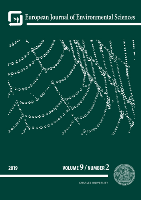
European Journal of Environmental Sciences
Scope & Guideline
Exploring Environmental Solutions, One Study at a Time
Introduction
Aims and Scopes
- Environmental Pollution and Remediation:
Research focusing on the effects of pollutants, such as pharmaceuticals and heavy metals, on ecosystems and human health, alongside innovative remediation techniques like phytoremediation. - Biodiversity and Conservation:
Studies examining species diversity, the impact of invasive species, and conservation strategies for native flora and fauna, particularly in the context of changing landscapes and climate. - Climate Change Impacts:
Analyses addressing the effects of climate change on ecosystems, species distributions, and habitat integrity, including adaptive management strategies to mitigate these impacts. - Urban Ecology and Land Use:
Exploration of how urbanization and land use changes affect environmental characteristics, biodiversity, and ecosystem services within urban and peri-urban settings. - Ecological Research Methodologies:
Methodological advancements in ecology, including statistical modeling, field studies, and experimental approaches aimed at understanding complex ecological interactions.
Trending and Emerging
- Ecocide and Environmental Law:
The integration of legal frameworks, such as international humanitarian law and ecocide, into environmental discourse is gaining traction, particularly in the context of conflict and environmental degradation. - Invasive Species Management:
An increasing focus on the management of invasive plant species highlights the urgency of addressing biodiversity loss and ecosystem management in various ecological contexts. - Impact of Urbanization on Thermal Dynamics:
Research exploring the thermal effects of urbanization on local climates is emerging, as urban areas increasingly confront challenges related to climate change and sustainability. - Effects of Herbicides on Ecosystems:
Studies assessing the ecological consequences of herbicides, particularly glyphosate, are on the rise, reflecting growing concerns about their impact on biodiversity and ecosystem health. - Climate-Smart Conservation Strategies:
The development of innovative conservation strategies that incorporate climate resilience is trending, emphasizing the need for adaptive approaches in biodiversity conservation.
Declining or Waning
- Traditional Agriculture Practices:
Research on traditional agricultural methods has decreased, as there is a growing emphasis on sustainable and innovative agricultural practices that consider environmental impacts. - Generalized Ecological Studies:
Broad ecological studies without specific applications or case studies have become less frequent, possibly due to a preference for targeted research that addresses specific environmental issues. - Historical Environmental Assessments:
Studies focusing solely on historical environmental conditions without linking them to current issues or management strategies have waned, suggesting a shift towards more applied research.
Similar Journals

Euro-Mediterranean Journal for Environmental Integration
Bridging Disciplines for Sustainable Development in the Euro-MediterraneanThe Euro-Mediterranean Journal for Environmental Integration, published by SPRINGER HEIDELBERG, serves as a pivotal platform for interdisciplinary research in the realm of environmental science, particularly focused on the unique ecological and socio-economic context of the Euro-Mediterranean region. With its ISSN 2365-6433 and E-ISSN 2365-7448, this journal aims to foster a collaborative approach to environmental challenges, integrating insights from various fields such as ecology, geography, and sustainable development. Since its inception in 2016, it has made significant strides, achieving a Q3 ranking in Environmental Science and maintaining a notable position within the Scopus rankings, sitting at #102 out of 233 in the general environmental science category, which reflects its growing influence in academic discourse. The journal is committed to open dialogue among researchers, professionals, and students aimed at advancing knowledge and promoting innovative solutions to pressing environmental issues. Access to its comprehensive articles and findings will be key to contributing to a more sustainable future.
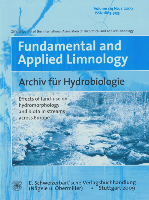
Fundamental and Applied Limnology
Navigating Freshwater Science: From Fundamental Studies to Practical SolutionsFundamental and Applied Limnology is an esteemed academic journal dedicated to the exploration of freshwater ecosystems, bridging the gap between fundamental research and practical applications. Published by E Schweizerbart'sche Verlagsbuchhandlung in Germany, this journal has been a vital resource in the fields of aquatic science and ecology since its inception in 2007. With its ISSN 1863-9135 and E-ISSN 1863-9135, it provides a platform for researchers to disseminate significant findings related to limnology, contributing to a rich understanding of freshwater biodiversity, water quality, and ecological interactions. Although currently rated in the Q3 quartile for aquatic sciences and ecology as per the 2023 rankings, it remains a valuable outlet for interdisciplinary research and practical insights, facilitating critical advancements in environmental management. Open access options enhance its visibility and accessibility, making it indispensable for researchers, professionals, and students alike who are committed to advancing the scholarship in freshwater studies. Engaging with this journal not only opens doors to the latest research findings but also fosters collaboration and innovation in the ecological community.

Ecological Solutions and Evidence
Empowering research to tackle pressing ecological challenges.Ecological Solutions and Evidence, published by WILEY, stands as a leading platform in the field of ecology, environmental science, and sustainability, with a commendable reputation starting from its inception in 2020. Operating under rigorous academic standards, this journal has achieved notable distinctions by securing a Q1 category ranking in Ecology, Management, Monitoring, Policy and Law, and Nature and Landscape Conservation, making it an invaluable resource for researchers seeking to address pressing environmental challenges. With a current impact factor reflective of its influential articles, the journal features an international scope, focusing on innovative solutions derived from empirical evidence. Accessible to a global audience, the journal encourages open discourse in the field, further supporting researchers, professionals, and students striving to foster ecological sustainability and informed policy-making. Published in the United Kingdom, it aims to bridge the gap between science and application in real-world contexts, promoting actionable insights and interdisciplinary collaboration.

EQA-International Journal of Environmental Quality
Advancing knowledge for a sustainable future.EQA-International Journal of Environmental Quality, published by the University of Bologna, Department of Agricultural Sciences, is a premier open-access journal dedicated to the multidisciplinary exploration of environmental quality issues. Established in 2009, it aims to foster a greater understanding of the intricate interactions between human activities and environmental health. With a focus on innovative research, the journal contributes to the advancement of knowledge across diverse fields, making it an essential resource for researchers, professionals, and students engaged in environmental science and sustainability. The journal operates with an emphasis on accessibility, ensuring that critical findings reach a global audience without barriers. With an impressive Scopus rank of 88 out of 171, EQA stands as a significant platform for disseminating impactful research that informs policy and promotes environmental stewardship.
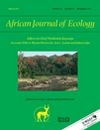
AFRICAN JOURNAL OF ECOLOGY
Connecting Research and Conservation in AfricaThe African Journal of Ecology, published by Wiley, is a leading academic journal in the field of Ecology, Evolution, Behavior, and Systematics. Established in 1963 and continuing its vital contributions to the field until 2024, this journal serves as a premier platform for researchers and scholars to share groundbreaking studies that explore the intricate relationships within ecosystems, particularly in the African context. With an impressive Scopus Rank of #423 out of 721 and a Q3 Quartile ranking, it stands as a credible source of scholarly information, gaining recognition among peers for its rigorous peer-review process and impactful publications. While the journal is not open access, it remains influential in driving advancements in ecological research and providing insights vital for conservation efforts and biodiversity studies. Authors and readers alike will find that the African Journal of Ecology not only promotes scientific inquiry but also fosters a deeper understanding of ecological dynamics that affect our world.
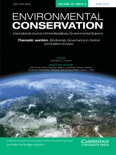
ENVIRONMENTAL CONSERVATION
Navigating the Challenges of Environmental SustainabilityENVIRONMENTAL CONSERVATION, published by Cambridge University Press, is a premier academic journal dedicated to advancing the field of environmental science and conservation. Since its inception in 1974, this journal has established a robust reputation, currently holding prestigious rankings in various categories including Q1 in Nature and Landscape Conservation and Q1 in Water Science and Technology, alongside notable Q2 rankings across several related fields. With its broad scope, ENVIRONMENTAL CONSERVATION covers critical topics in health, toxicology, pollution control, and environmental policy, making it an essential resource for researchers, professionals, and students aiming to address the pressing challenges of environmental sustainability. Despite not being an open-access journal, its impactful content, demonstrated by its significant positions in Scopus rankings, enhances scholarly discourse and informs policy worldwide. As we approach its 50th anniversary, this journal remains pivotal in fostering innovative research and promoting best practices in environmental stewardship.

BIOLOGY AND ENVIRONMENT-PROCEEDINGS OF THE ROYAL IRISH ACADEMY
Pioneering Discoveries in Biological and Environmental ResearchBIOLOGY AND ENVIRONMENT - PROCEEDINGS OF THE ROYAL IRISH ACADEMY serves as a vital platform for advancing knowledge in the rapidly evolving fields of biological and environmental sciences. Published by the esteemed Royal Irish Academy, this journal, with an ISSN of 0791-7945 and an E-ISSN of 2009-003X, offers a rich compilation of research articles, reviews, and proceedings that cater to the academic community in Ireland and beyond. Since its inception in 1993 and continuing through to 2024, the journal has positioned itself as a valuable resource within the Q4 category in Agricultural and Biological Sciences and Environmental Science, as detailed by the 2023 Scopus rankings. While not currently offering open access, its contributions significantly impact understanding and discussions surrounding ecological and biological challenges. Researchers, professionals, and students alike will find that the journal not only reflects current trends, but also pushes the boundaries of research, making it an essential read for anyone invested in the study of the natural world.
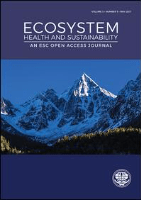
Ecosystem Health and Sustainability
Exploring the intersection of ecology and human well-being.Ecosystem Health and Sustainability, published by the American Association for the Advancement of Science, is a premier journal in the field of ecological research and sustainability. Established as an Open Access journal since 2015, it has made significant strides in disseminating impactful research that addresses contemporary challenges in ecosystem health within a global context. With an impressive impact factor reflected in its consistent placement in the Q1 category across multiple fields—including Ecology, Evolution, Behavior and Systematics, as well as Management, Monitoring, Policy, and Law—this journal serves as a vital resource for researchers, professionals, and students alike. Based in the United Kingdom, the journal has shown notable performance in Scopus rankings, positioning itself within the top percentiles across various ecological specialties. As it continues its convergence through 2024, Ecosystem Health and Sustainability is committed to fostering the exchange of knowledge and promoting the integration of science and policy to advance sustainable practices globally.
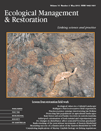
ECOLOGICAL MANAGEMENT & RESTORATION
Transforming research into impactful environmental practices.Ecological Management & Restoration is a premier international journal published by Wiley, dedicated to advancing the fields of ecology, environmental management, conservation, and restoration practices. With an impact factor that positions it in the Q2 category across various ecological and management domains, this journal serves as a critical platform for researchers and professionals seeking to address contemporary issues related to ecosystem health, biodiversity, and sustainable management. Covering a wide range of topics from ecological restoration techniques to policy impacts on nature conservation, the journal caters to a diverse audience and contributes to the scientific community's understanding of environmental challenges. Importantly, the journal provides significant visibility, ranking in the top percentiles within key ecological research arenas such as Nature and Landscape Conservation, reinforcing its value for researchers aiming to influence both scientific thought and practical applications in ecology and management. The journal's commitment to disseminating high-quality research makes it an essential resource for students, researchers, and practitioners dedicated to fostering a sustainable future.

GLOBAL JOURNAL OF ENVIRONMENTAL SCIENCE AND MANAGEMENT-GJESM
Empowering interdisciplinary solutions for a sustainable future.Global Journal of Environmental Science and Management (GJESM), published under the distinguished leadership of Professor J. Nouri, is an esteemed academic platform dedicated to advancing the interdisciplinary discourse surrounding environmental science and management. With an ISSN of 2383-3572 and an E-ISSN of 2383-3866, GJESM has established itself as a prominent Open Access journal since 2014, allowing for unrestricted sharing of knowledge and research findings. Based in Iran, this journal caters to a diverse global audience, featuring contributions that span various critical domains including agricultural and biological sciences, environmental engineering, pollution management, and social sciences, evidenced by its impressive 2023 Q1 and Q2 quartile rankings across multiple categories. The journal’s Scopus rankings demonstrate a robust standing in the academic landscape, with exciting placements that underscore its relevance in key fields. By bridging the gap between scientific inquiry and practical application, GJESM serves as a vital resource for researchers, practitioners, and students seeking to understand and address the pressing environmental challenges faced by our planet today.